#monsieur verdoux
Explore tagged Tumblr posts
Text

16 notes
·
View notes
Text

“Monsieur Verdoux” 1947
23 notes
·
View notes
Text
youtube

Context: Monsieur Verdoux was a banker turned murderer to support his wife and disabled son. This is his final speech as hes about to be hanged.
Charlie Chaplin was kicked out of the US for it as a ‘commie’ film (1947)
Feels kinda relevant rn dunno why
#charlie chaplin#monsieur verdoux#fuck capitalism#end stage capitalism#1947#2024#2024 elections#trump#biden#poverty#rent#millenials#millennials#Youtube#unity punk#cripple punk#punk#anarchy#economy
14 notes
·
View notes
Photo

Monsieur Verdoux (Charlie Chaplin, 1947)
#monsieur verdoux#charlie chaplin#martha raye#comedy#black comedy#classic film#classicfilmsource#classicfilmedit#old hollywood#oldhollywoodedit#my gifs#1940s
103 notes
·
View notes
Text

Charlie Chaplin and Suzanne Ridgeway on the set of the film "Monsieur Verdoux" directed by Charlie Chaplin (1947)
- Pictured below is Charlie with Martha Raye.

4 notes
·
View notes
Text
445 to go
The Adventures of Robin Hood (1938, dir. Michael Curtiz, William Keighley): Looks and feels like a storybook adventure come to life. The story is very simple and familiar to those who know the legend of Robin Hood but it feels exciting and fresh here, and the use of technicolor makes the film a visual feast. Errol Flynn is extremely charming but my heart, as always, belongs to Olivia de Havilland.
The Kid Brother (1927, dir. Ted Wilde): My first Harold Lloyd and if this is representative of his oeuvre then I have been sorely missing out. The comedy is solid, the romance is charming, and Harold Lloyd is so very likable, even while playing a very clichéd character archetype.
Stranger Than Paradise (1984, dir. Jim Jarmusch): Bleak but beautiful. A film about wanting to reach out and wanting to escape, and managing neither.
Diva (1981, dir. Jean-Jacques Beineix): This movie is gorgeous to look at and to listen to, but it feels like it's only scratching at the surface of the topics it's trying to explore. I do like the protagonist a lot, though; this sad, wet puppy of a young man who would come across as a monumental creep if he didn't feel so sincere in his intentions.
Gallipoli (1981, dir. Peter Weir): This movie is about 80% a coming-of-age tale and 20% anti-war film, and it works surprisingly well. Possibly the most effective anti-war film I've seen since Come and See, though much less punishing to watch.
Loulou (1980, dir. Maurice Pialat): Incredibly, obnoxiously french. Isabelle Huppert is enchanting as always.
Atlantic City (1980, dir. Louis Malle): I love it when a film incorporates the setting so well both plot-wise and thematically. The characters are all extremely flawed but mostly very lovable, with Susan Sarandon anchoring what threatens to be a touch too-farcical tale.
Monsieur Verdoux (1947, dir. Charlie Chaplin): Such a strange watch, I'm honestly not sure if I liked it or not. Chaplin plays a wildly different role here than I'm used to (for one, he actually talks!) but the tone of the film is even stranger - it's so dark and pessimistic, it kind of left me depressed.
+
And with this entry I am officially half-way through this project! By extreme coincidence, today also happens to be the three year anniversary of this blog. Here's hoping it won't take me another three years to finish the list!
#1001 movies#the adventures of robin hood#the kid brother#stranger than paradise#diva#gallipoli#loulou#atlantic city#monsieur verdoux
3 notes
·
View notes
Photo
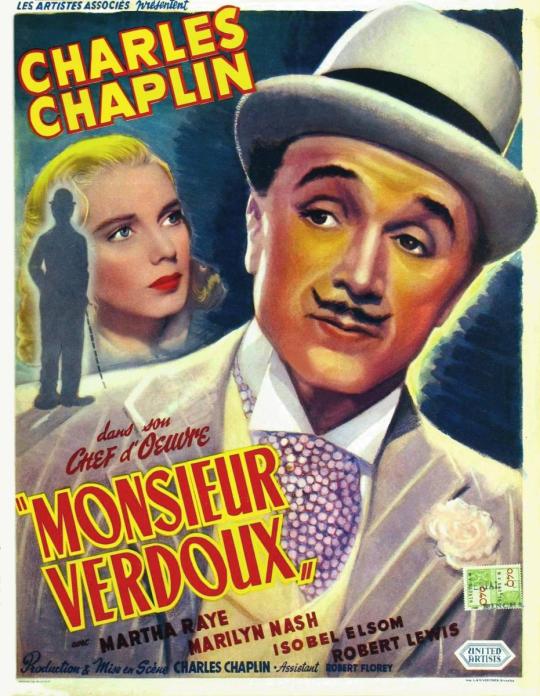
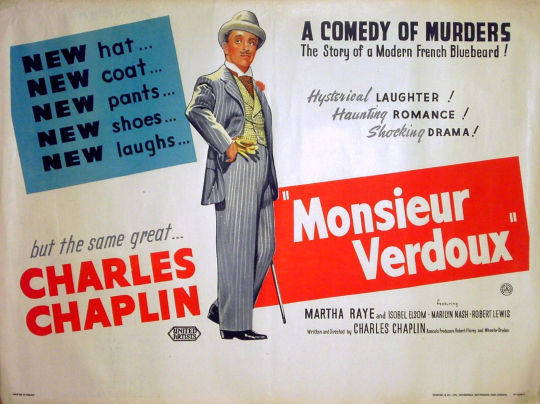
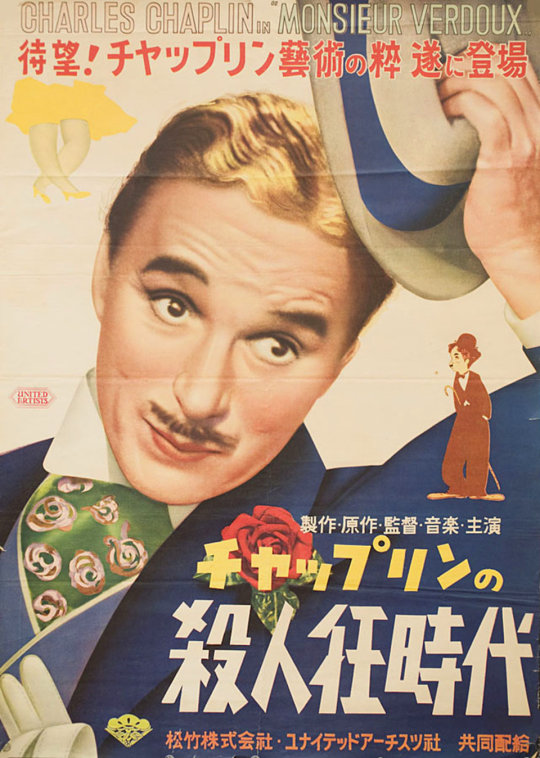

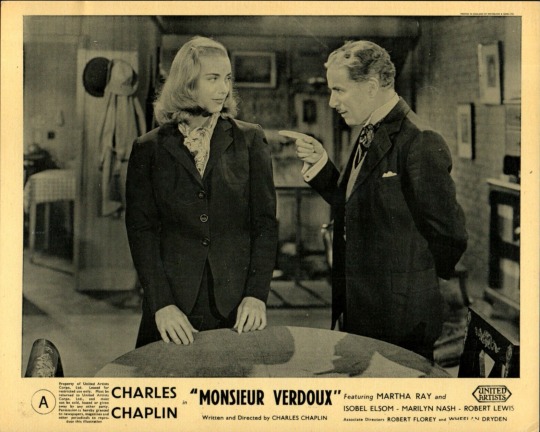
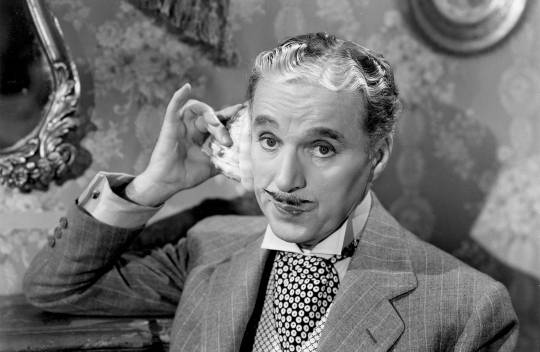

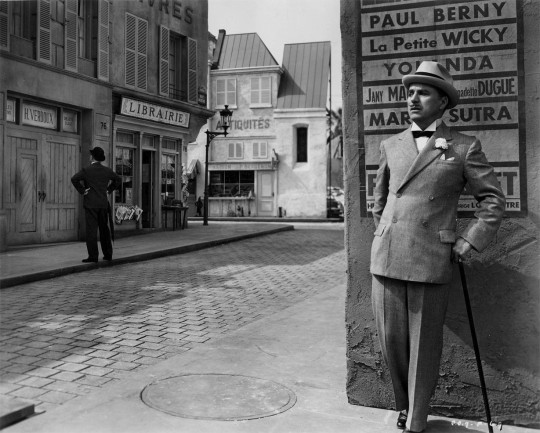


Monsieur Verdoux (1947) Charlie Chaplin
January 2nd 2023
#monsieur verdoux#1947#charlie chaplin#martha raye#marilyn nash#isobel elsom#marjorie bennett#mady correll#robert lewis#margaret hoffman#almira sessions#edwin mills#lois conklin#edna purviance#orson welles#a comedy of murders#the ladykiller#monsieur verdoux: a comedy of murders
39 notes
·
View notes
Text
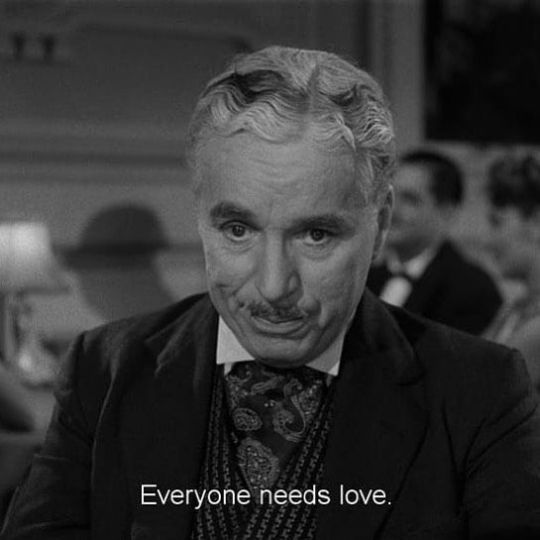
3 notes
·
View notes
Text


Monsieur Verdoux (1947)
By Charlie Chaplin.
15 notes
·
View notes
Text
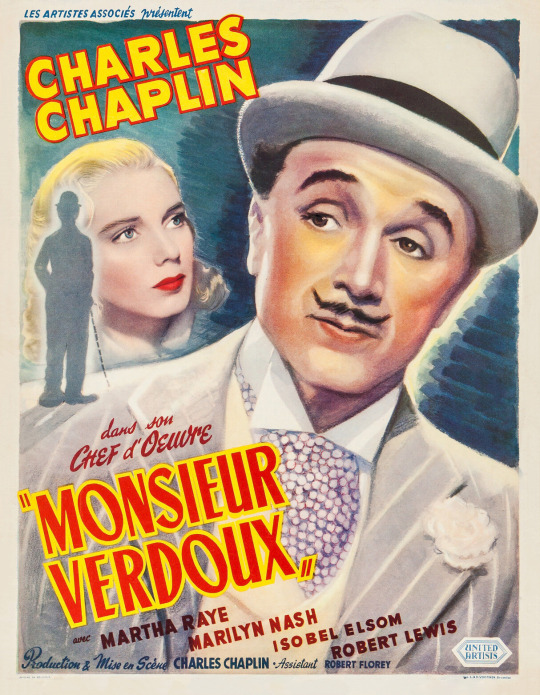
Monsieur Verdoux - Charles Chaplin - 1947. ★★★☆
1 note
·
View note
Text

Zum Schluss wird es dann doch etwas pathetisch, beklagt der Tobi an Charles Chaplins ansonsten reizender Gattinen-Serienmörder-Komödie Monsieur Verdoux. Aber wird es ja irgendwie immer.
#Monsieur Verdoux#Martha Raye#Isobel Elsom#Marilyn Nash#Mady Correll#Margaret Hoffman#Film gesehen#Charles Chaplin
0 notes
Photo
Monsieur Verdoux (1947). Director: Charles Chaplin.

Monsieur Verdoux
194 notes
·
View notes
Text
Remembering legendary actor, filmmaker, writer, composer Sir Charlie Chaplin! ^__^
#geek#film#blog#happy birthday#actor#filmmaker#charlie chaplin#comedian#academy award winner#limelight#the kid#modern times#the great dictator#monsieur verdoux#a countess from hong kong#a woman in paris#the gold rush#silent era#silent film#talkies#golden age of hollywood#pop culture#the tramp#gone but not forgotten#geek with clip ons#i review stuff#irs
0 notes
Photo

Charles Chaplin and Martha Raye in Monsieur Verdoux (Charles Chaplin, 1947)
Cast: Charles Chaplin, Mady Correll, Allison Roddan, Robert Lewis, Audrey Betz, Martha Raye, Ada May, Isobel Elsom, Marjorie Bennett, Helene Heigh, Margaret Huffman, Marilyn Nash, Irving Bacon. Screenplay: Charles Chaplin, based on an Idea by Orson Welles. Cinematography: Roland Totheroh. Art direction: John Beckman. Film editing: Willard Nico. Music: Charles Chaplin. At the end of Monsieur Verdoux, Charles Chaplin, in the title role, walks away toward his execution by guillotine, just as his Little Tramp character used to walk away toward the horizon in his earlier films. It's a richly ironic moment, not just because Chaplin is parodying the endings of his other movies, but also because it would come to symbolize the beginning of the end of his career. He would make three more films, only one of which, Limelight (1952), would attract an audience (mainly in Europe) and earn some critical respect. Of the other two, A King in New York (1957) was not even released in the United States until 1973, and although The Countess From Hong Kong (1967) did get American distribution, it was generally panned even by critics inclined to favor Chaplin and was a major box office flop. Monsieur Verdoux is a key work in its revelation of Chaplin's strengths and weaknesses. His strengths are still there: He was, when he wanted to be, a very funny actor, and there is one scene -- Verdoux and Annabella (Martha Raye) in a rowboat -- that is among the most hilarious sequences ever filmed. His weaknesses stemmed from his desire to be more than funny: to make statements about the way he saw the world. The ending of The Great Dictator (1940) was marred when he shifted from satire to sermon, and the rather muzzy anticapitalism expressed by Verdoux in the final scenes strikes us today as banal. Unfortunately, in 1947 it struck many as worse than that. In the increasingly heated anticommunist fervor of the day it was at least heresy, at worst treason. Monsieur Verdoux was picketed and banned and eventually withdrawn from circulation in the United States, not to be seen here until 1964. It confused most of the critics in 1947 with its shifts in tone and its rather old-fashioned mise-en-scène and cutting, but it had its defenders, chief among them James Agee, who wrote a long, impassioned multipart essay for The Nation defending the film. "I love and revere the film as deeply as any I have ever seen," Agee wrote, "and believe that it is high among the great works of this century." Not many people would go that far today. Monsieur Verdoux has its longueurs and its unfortunate wanderings into Chaplin's particular brand of sentimentality, especially the wheelchair-bound wife and adorable child. It betrays Chaplin's perennial weakness for the pretty girl in his casting of the wooden Marilyn Nash in what seems to have been intended as a key role but which fizzles because it's awkwardly written and performed. Even the title role is inconsistently written and performed: Chaplin's dapper Verdoux suddenly turns into a slapstick clown and just as suddenly back into the suave and sinister serial killer, undercutting the high-minded pseudo-Shavian irony of his final apologia: "As for being a mass killer, does not the world encourage it? Is it not building weapons of destruction for the sole purpose of mass killing? Has it not blown unsuspecting women and little children to pieces? And done it very scientifically? As a mass killer, I am an amateur by comparison." Monsieur Verdoux feels something like a scene from Act IV in the tragicomedy that was Chaplin's life. If the first three acts were about his rise to success, despite controversy over his personal life and his politics, the fourth act finds his artistic instincts failing him and the controversies forcing him into exile. Only in the fifth act does the adulation that once surrounded him revive.
0 notes
Photo
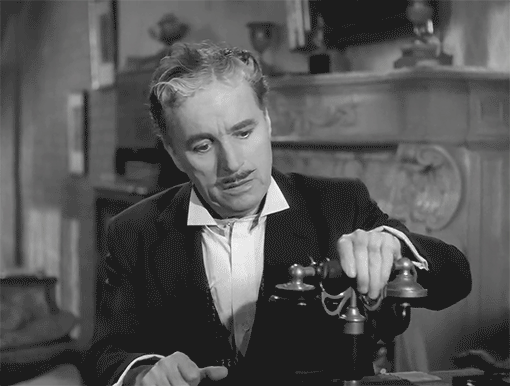
Monsieur Verdoux (Charlie Chaplin, 1947)
#charlie chaplin#monsieur verdoux#classic film#classicfilmsource#classic film stars#old hollywood#comedy#black comedy#1940s#my gifs
65 notes
·
View notes
Text
Monsieur Verdoux (1947)
A serial wife killer tries to scam enough money to support his real wife and child but discovery follows him wherever he runs.
It’s a pretty big change from Chaplin’s usual roles, not just because of the transition to sound but because his character has gone from harmless comedy tramp to believable murderer. The social criticism is effective enough and some lines carried appropriate gravitas. Another difference is that it’s more coherent than Chaplin’s previous entries too.
The plot is highly coincidence based which tests the suspension of disbelief but also enhances the comedy a little so it’s excusable. The early half of the film is somewhat slow and many of the scenes could potentially be cut without affecting the flow of the narrative very much since the demonstration of his con isn’t that complex and gets repetitive.
There’s still plenty of visual comedy to satisfy the fans of his previous work and most of it works rather well and harkens back to the silent era. Most of the satire actually works out justified since the protagonist is still punished in the end to emphasise the double standard. The dialogue with the ex-con woman were good scenes and the deep topics made a nice contrast to the falsehoods and mundane small-talk with the other women.
One less durable aspect is that the economic turmoil is blamed almost exclusively on world war two which hasn’t been repeated since whereas similar financial crisis are regular now and their effects are similar to those on the characters so it’s have been more efficient to criticise capitalism as a whole for it, which includes the war. There’s very little mourning for Verdoux’s real family which was a missed opportunity for decent character expression and drama.
5/10 -Can’t find a better example of average-
-At the time of release Indochina was still a colony of France so it would have been less uncommon for a citizen to live there for long periods to work.
-Despite the opening describing the film as based on an idea from Orson Welles, it’s actually based on a real serial killer.
-Popular with European critics and Chaplin’s favourite of his own films, nonetheless flopped in the US.
0 notes